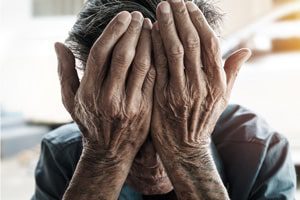
Content approved by Jerry Parker Anyone can be a victim of abuse, but some people are at a higher risk of mistreatment because they cannot protect themselves, including children and the elderly. Elder abuse involves adults over the age of 60, and it’s a problem that’s grossly underreported; estimates suggest that for every known case […]
Content approved by Jerry Parker
 Anyone can be a victim of abuse, but some people are at a higher risk of mistreatment because they cannot protect themselves, including children and the elderly. Elder abuse involves adults over the age of 60, and it’s a problem that’s grossly underreported; estimates suggest that for every known case of elder abuse, 24 others are not reported. Nursing home abuse can involve abuse of nursing home residents by staff members, but it can also consist of elder-to-elder abuse. It’s important to learn about signs to watch for so you can protect a senior family member.
Anyone can be a victim of abuse, but some people are at a higher risk of mistreatment because they cannot protect themselves, including children and the elderly. Elder abuse involves adults over the age of 60, and it’s a problem that’s grossly underreported; estimates suggest that for every known case of elder abuse, 24 others are not reported. Nursing home abuse can involve abuse of nursing home residents by staff members, but it can also consist of elder-to-elder abuse. It’s important to learn about signs to watch for so you can protect a senior family member.
Elder abuse can include a number of different acts that cause harm. Abuse may be physical, sexual, or psychological in nature. Abuse may also consist of financial exploitation. Physical abuse is any intentional act that causes distress, pain, harm, or illness. Physical abuse may consist of a violent act such as hitting, scratching, pushing, shaking, slapping, kicking, or burning, but it can also involve intentionally withholding care or assistance. This neglect may include not providing necessary nutrition, clothing, hygiene, shelter, or health care. Sexual abuse is forced or unwanted sexual interaction of any kind. Psychological abuse includes actions that cause pain, fear, distress, or anguish. Examples of this type of abuse include threatening, humiliating, and isolating an elderly person. And in cases of financial exploitation, an abuser may engage in unauthorized or improper use of an elderly person’s resources to benefit someone other than the elderly person. Tactics for financial exploitation may include threats, coercion, and deception.
Isolation of the elderly is one of the main risk factors for abuse of this age group. Senior citizens may live far away from family without having loved ones actively involved with their daily life. Mental impairment and communication difficulties can also place elderly people at risk for abuse because they can’t speak up to report abusive actions. It’s also common for elderly people to be confused about how to get help if abuse happens; they may not know how to report it or who to tell.
When an elderly family member is in a nursing home, it’s imperative to remain vigilant about potential signs of abuse. Recognizing warning signs will help you notice them so you can take action if it’s necessary. Any unusual injuries or ailments demand swift attention. These physical signs may include bruising, abrasions, pressure marks, or broken bones. If the person’s behavior or demeanor changes abruptly, such as an atypical withdrawal from people and activities, abuse may be the cause. Some elderly people may also exhibit other types of behavior if they’re being abused, such as unusual signs of alertness. Their physical appearance may change due to factors such as weight loss or poor personal hygiene. Neglectful abuse could also include unmet medical or physical needs; keep an eye out for things like missed medical appointments, missed medication, or unsanitary living conditions. An elderly person who is being exploited financially may begin having trouble paying bills, might make sudden changes in legal documents, or may have possessions suddenly disappear without explanation.
If warning signs are evident, it’s important to act swiftly. When the danger is immediate and serious, call 911 for help. If staff members of a nursing home are implicated in the abuse, contact nursing home administrators to discuss these concerns. You might also contact local and state licensing authorities with complaints about care and potential abuse. Contacting the nursing home resident’s physician is another option for getting assistance with an abusive situation.
Visit these websites to learn more about nursing home abuse and legal action to take if it occurs:


